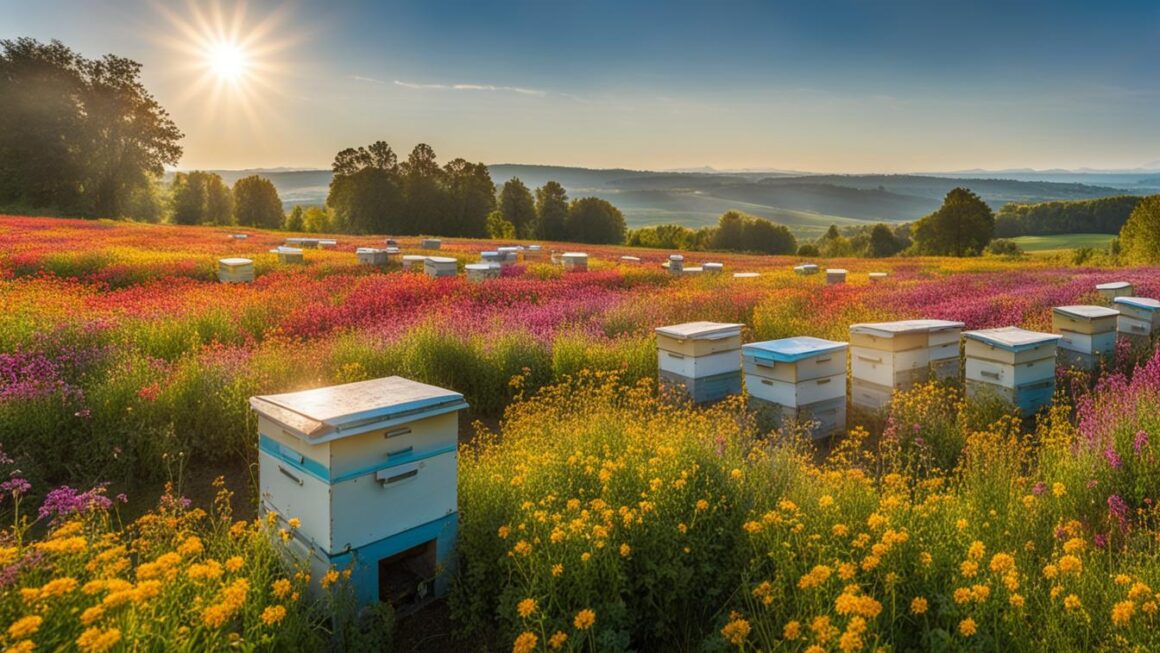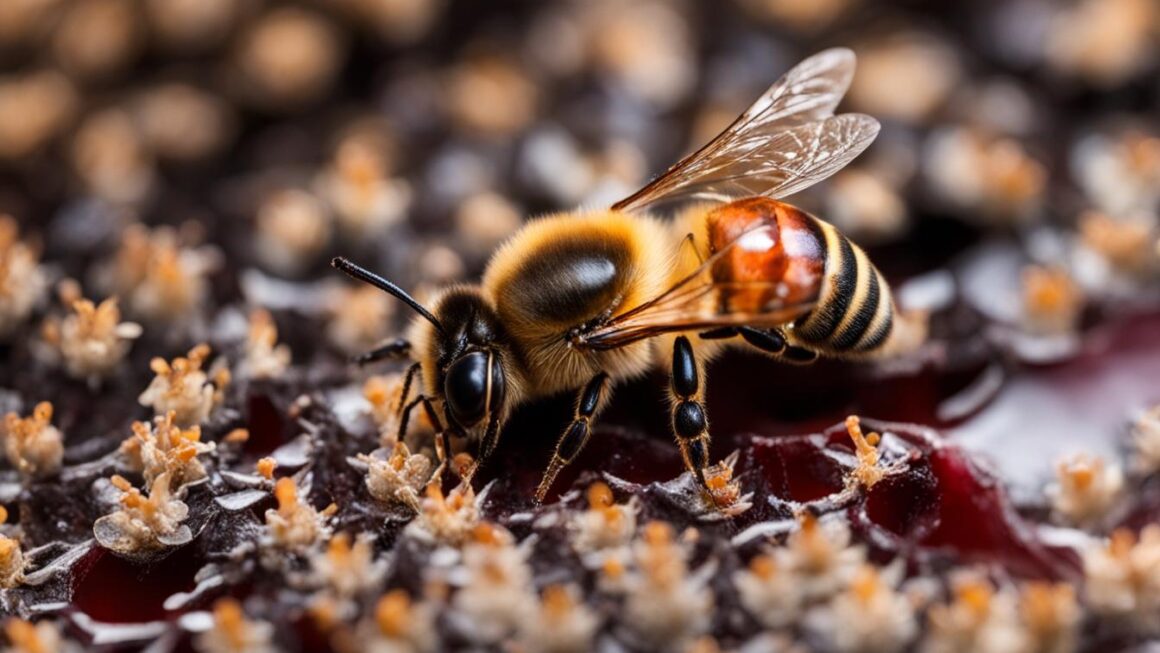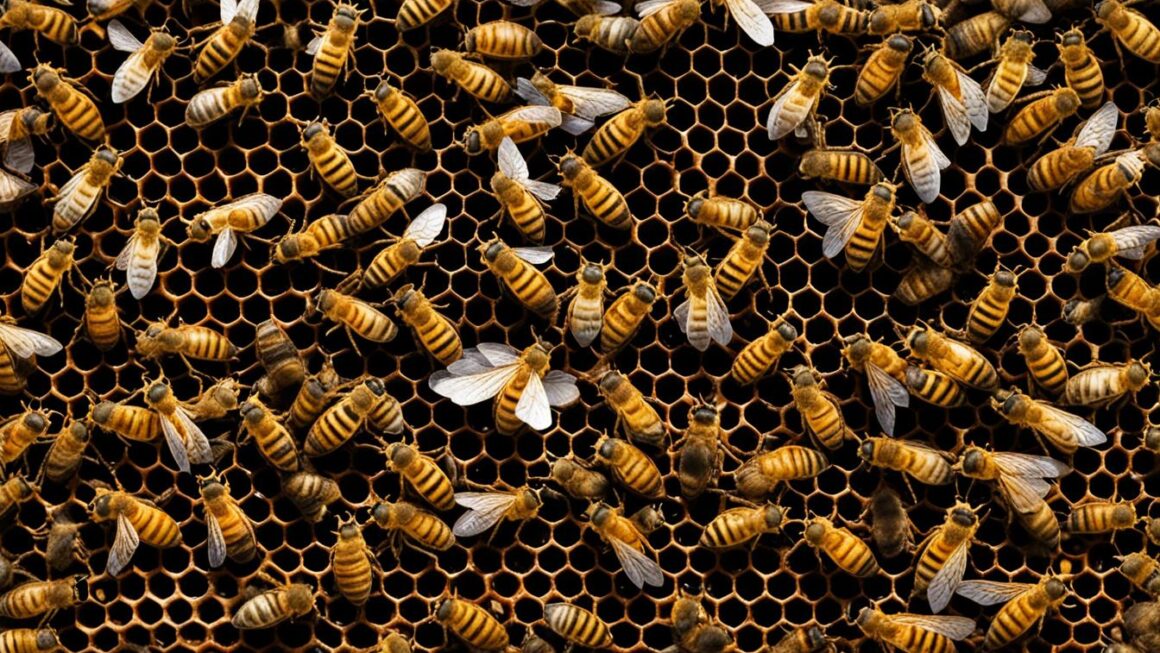Have you ever wondered where bee pollen comes from and how it’s harvested? Bee pollen farms are dedicated to the collection and processing of this nutritious substance, which is hailed for its numerous health benefits. Freshly harvested bee pollen contains a wide range of essential nutrients, including amino acids, vitamins, and minerals, making it a valuable addition to any diet.
From small, local bee pollen farms to large-scale commercial operations, discover the world of bee pollen farming and the benefits it can offer you.
Key Takeaways:
- Bee pollen farms collect and process nutritious bee pollen for consumption.
- Freshly harvested bee pollen contains a range of essential nutrients, including amino acids, vitamins, and minerals.
- Local bee pollen can offer unique benefits, supporting immunity and reducing seasonal allergies.
- The process of pollen harvesting involves collecting pollen from honeybees and processing it into a consumable form.
- Consuming bee pollen can support overall health and wellness.
Understanding Bee Pollen Production in Beekeeping Farms
Bee pollen production is a highly intricate process that requires specialized equipment and knowledge. At beekeeping farms, bees collect pollen from flowers and store it in small sacs on their legs. Beekeepers then use pollen traps, which are small screens that the bees must pass through to enter the hive. As the bees squeeze through, some of the pollen falls off and is collected in the trap.
Once collected, beekeepers must carefully process the pollen to ensure its purity and organic nature. This involves removing any foreign matter, such as bits of wax or bee parts, and drying the pollen to prevent spoilage. The resulting organic bee pollen is a highly nutritious and beneficial superfood.
| Bee Pollen Production Techniques: | |
|---|---|
| 1. Pollen Traps | Small screens attached to the hive entrance that collects pollen as bees pass through |
| 2. Comb Collection | Removal of the comb from the hive and scraping the pollen off |
| 3. Pollen Trays | Plastic trays placed in the hive that the bees fill with pollen |
When shopping for bee pollen products, it is crucial to seek out organic bee pollen from reputable sources. Non-organic pollen can be contaminated with pesticides or other harmful chemicals, which can negate its health benefits. By choosing organic bee pollen, you can ensure that you are getting a pure and potent product that is free from harmful contaminants.
The Nutritional Powerhouse: Exploring Bee Pollen Benefits
When it comes to bee products, bee pollen is widely regarded as a nutritional powerhouse. This tiny yellow granule is packed with a wide range of essential nutrients, making it a popular supplement among health enthusiasts. Bee pollen is collected by honeybees from the stamen of flowers and mixed with nectar to form a granule, which is then stored in the hive’s honeycomb.
Bee pollen is a rich source of vitamins, minerals, and antioxidants, which are essential for maintaining overall health and well-being. It contains high levels of protein, amino acids, and essential fatty acids, making it an ideal supplement for vegans and vegetarians. In addition, bee pollen contains enzymes that can improve digestion and nutrient absorption.
Bee pollen has been shown to enhance immune function, reduce inflammation, and improve energy levels. It has also been found to have antibacterial, antifungal, and antiviral properties, making it a potential natural remedy for various infections.
One study found that consuming bee pollen can improve allergy symptoms, particularly seasonal allergies. Local bee pollen, in particular, has been found to be effective in treating allergies, as it contains trace amounts of pollen from local plants that can help desensitize the immune system to allergens in the area.
Bee Products from Honeybee Farms
Bee pollen is just one of many valuable products that can be harvested from honeybee farms. Honey, propolis, royal jelly, and beeswax are all examples of other bee products that have been used for centuries for their health benefits.
Honey is a natural sweetener that is a rich source of antioxidants and has antibacterial properties. It has been used as a natural remedy for coughs and sore throats and is also a popular ingredient in skincare products.
Propolis is a resin-like substance that honeybees collect from trees and plants. It has antiseptic and anti-inflammatory properties and has been used to treat various infections and skin conditions.
Royal jelly is a milky substance that is produced by worker bees and fed to the queen bee. It is a rich source of nutrients and has been found to have anti-aging and anti-inflammatory properties. It is often used in skincare products to improve skin texture and tone.
Beeswax is a natural wax that is produced by honeybees. It has antibacterial properties and is often used in skincare products to moisturize and soothe dry skin.
Overall, bee products from honeybee farms are a valuable source of natural remedies and supplements that can enhance overall well-being. Whether it’s bee pollen for immune function or honey for coughs and sore throats, these products have been used for centuries for their health benefits.
The Process of Pollen Harvesting: From Hive to Farm
In bee pollen farms, the process of pollen harvesting starts with the bees. Honeybees collect pollen from plants with the help of their specialized body parts, including their legs and tongues. As they move from flower to flower, bees pick up and transport pollen grains, gathering them into pollen baskets on their hind legs.
Once the pollen baskets are full, bees return to their hive, depositing the pollen into cells within the hive. Beekeepers use specialized equipment to collect the pollen from these cells, ensuring that only a small percentage is removed to maintain the hive’s health.
The collected pollen is then carefully processed to ensure its purity and quality. In bee pollen farms, this involves removing any debris or foreign objects, such as dirt or bee parts, before drying the pollen and storing it in airtight containers.
Local bee pollen is highly sought after for its unique properties. Pollen from different regions can contain varying combinations of nutrients and compounds depending on the plants available in the area. By consuming local bee pollen, individuals can benefit from the specific nutritional profile of the plants in their region.
Sourcing Fresh and Pure Bee Pollen from Certified Farms
When it comes to reaping the full benefits of bee pollen, sourcing it from certified bee pollen farms is essential. Not all bee pollen is created equal, and consuming pollen that is tainted with pesticides and other contaminants can pose health risks. That’s why it’s crucial to find certified organic bee pollen farms that prioritize sustainability and ethical beekeeping practices.
Local bee pollen is also a great option for maximizing health benefits. Local pollen is harvested from bees that have foraged on regional plants, which can help support the immune system and alleviate seasonal allergies. Additionally, supporting local bee pollen farms helps sustain the local ecosystem and promotes regional biodiversity.
Organic Bee Pollen Farms
Organic bee pollen farms prioritize using natural methods for pollen collection and processing. They avoid using harmful chemicals, which can pollute the environment and harm honeybee populations. By choosing organic bee pollen, consumers can ensure they are consuming high-quality, pure pollen, free from contaminants.
One great example of an organic bee pollen farm is Beekeeper’s Naturals, which produces 100% pure, sustainably sourced bee products. Their bee pollen is collected from remote green apiaries in the wildflower fields of Northern Spain and undergoes rigorous testing to ensure maximum purity and potency.
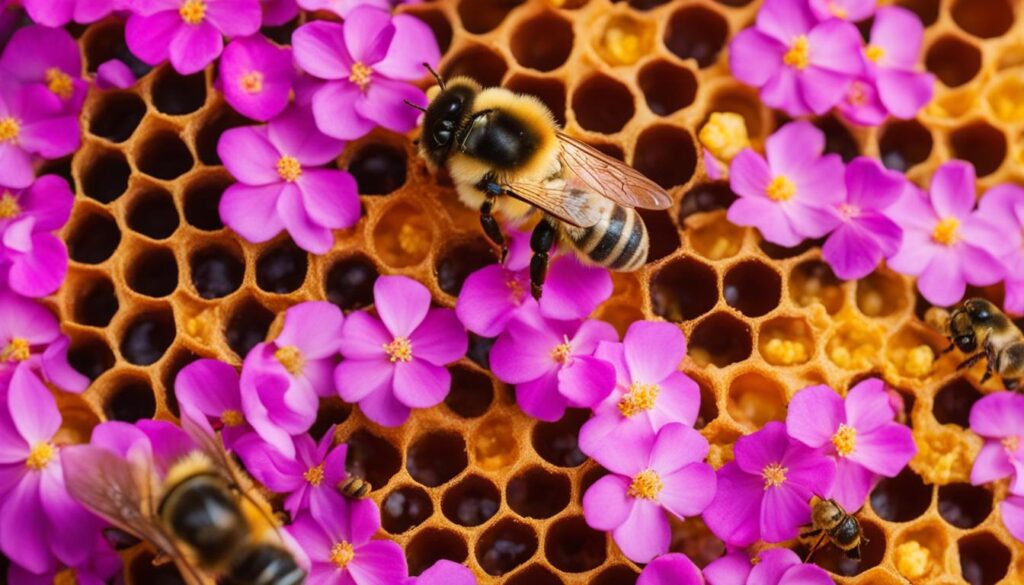
Incorporating Bee Pollen into Your Daily Routine
Now that you understand the benefits of bee pollen, the next step is to incorporate it into your daily routine. With its unique taste and texture, bee pollen can be added to a variety of meals, snacks, and beverages.
Ways to Use Bee Pollen
Here are some creative ways to include bee pollen in your diet:
- Sprinkle it on top of yogurt or oatmeal for a crunchy, nutrient-rich breakfast
- Add it to smoothies for a boost of energy and essential nutrients
- Mix it into salad dressings for a unique flavor and nutritional punch
- Incorporate it into baked goods like muffins or granola bars
When using bee pollen for the first time, start with a small amount to test for any potential allergic reactions. It is recommended to consume 1-2 teaspoons of bee pollen per day, gradually increasing the amount as your body adjusts.
Where to Find Bee Pollen
When sourcing bee pollen, it is important to choose a reliable and reputable supplier. Look for bee pollen from local bee pollen farms to ensure its freshness and potency. Additionally, organic bee pollen is free from harmful pesticides and other contaminants, making it the safest and healthiest option.
Tip: Check your local farmers’ markets or health food stores for locally sourced bee pollen.
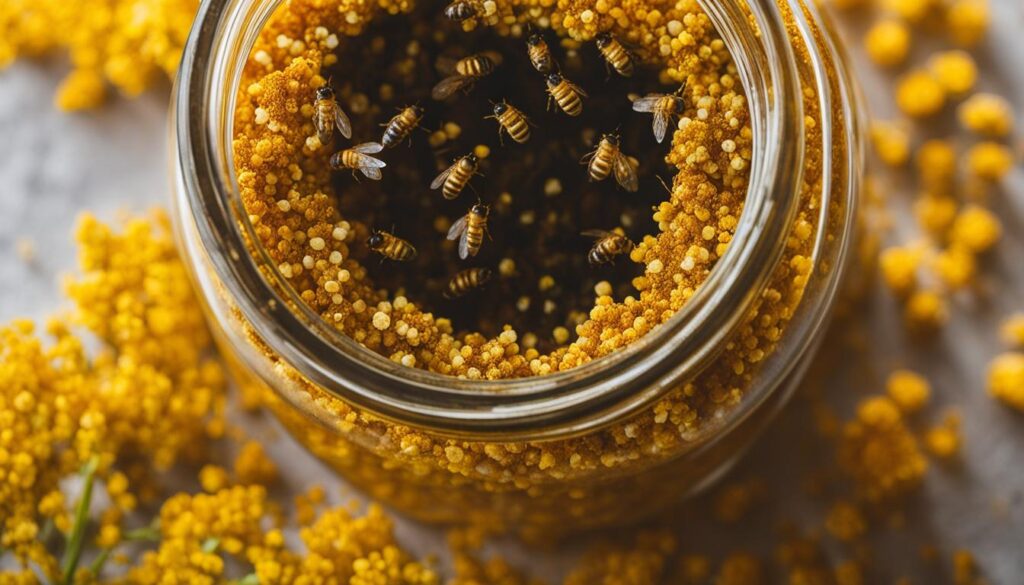
By incorporating bee pollen into your daily routine, you can reap the numerous health benefits it provides. Whether added to your morning smoothie or sprinkled on top of your favorite dish, bee pollen is a versatile and nutritious addition to any diet.
Exploring Other Bee Products and Their Health Benefits
Alongside bee pollen, honeybee farms provide various other bee products, each with its unique set of benefits.
Honey: A natural sweetener that also boasts numerous health benefits, honey has antioxidant and antibacterial properties. It can soothe sore throats, aid digestion, and even promote wound healing.
| Bee Product | Benefits |
|---|---|
| Propolis: | A resinous substance collected by bees, propolis has antifungal, antimicrobial, and anti-inflammatory properties. It can help boost the immune system and even fight off certain types of cancer. |
| Royal Jelly: | A milky substance produced by bees, royal jelly is rich in vitamins and minerals. It can help improve cognitive function, enhance skin health, and even lower blood pressure. |
| Beeswax: | A natural wax produced by bees, beeswax has anti-inflammatory and antibacterial properties. It can help soothe skin irritations, moisturize the skin, and even aid in pain relief. |
From honey to beeswax, these bee products offer numerous health benefits. Incorporating them into your daily routine can enhance overall well-being.
The Future of Bee Pollen Farms: Sustainable Practices and Conservation
Bee pollen farms have a critical role to play in sustainability and conservation efforts. Organic bee pollen farms prioritize sustainable practices, ensuring that honeybee populations are protected and preserved.
By maintaining organic bee pollen farms, it is possible to prevent harmful pesticides and chemicals from entering the environment. This supports biodiversity and encourages sustainable agriculture, which is becoming increasingly important in the face of climate change.
“Beekeeping is a critical component in protecting our planet’s natural resources and biodiversity. By supporting local bee pollen farms and organic bee pollen, we can help secure a sustainable and healthy future for all.”
Beyond the benefits to the environment, organic bee pollen farms provide an essential economic contribution to local communities. The demand for local bee pollen and other bee products supports the growth of small-scale honeybee farms, which provide livelihoods and strengthen local economies.
To ensure the sustainability of bee pollen farms, it is essential to prioritize conservation efforts that support honeybee populations. This includes creating habitats that encourage pollination and protect bee colonies from environmental pressures such as habitat loss and disease.
Sustainable Practices in Bee Pollen Farming
Organic bee pollen farms implement sustainable practices that prioritize the well-being of honeybee populations and the environment. These include:
| Sustainable Practice | Description |
|---|---|
| Minimal Use of Pesticides and Chemicals | Using natural methods to control pests and disease, rather than relying on harmful chemicals. |
| Preserving Natural Habitats | Protecting the natural habitats of honeybee colonies and creating new habitats to promote pollination. |
| Supporting Biodiversity | Encouraging the growth of diverse plant species to provide a variety of pollen and nectar sources for honeybees. |
| Collaboration with Local Communities | Working with local communities to support sustainable agriculture, as well as educating consumers on the importance of bee product consumption. |
By prioritizing these sustainable practices, bee pollen farms can support the preservation of honeybee populations and contribute to a more sustainable future.
Organic bee pollen is produced without the use of harmful pesticides or chemicals, ensuring its purity and nutritional value. By supporting organic bee pollen farms, you are contributing to the preservation of honeybee populations and the environment while reaping the powerful health benefits of this natural superfood.
Conclusion
In conclusion, incorporating bee pollen into your daily routine from certified, organic bee pollen farms can provide numerous health benefits. As a nutritional powerhouse, bee pollen is packed with essential vitamins, minerals, and antioxidants that can enhance immune function, boost energy levels, and support overall well-being.
Not only do bee pollen farms offer a valuable source of natural bee products, but they also play a crucial role in preserving honeybee populations and the environment. Supporting sustainable practices and conservation efforts in the beekeeping industry is essential for promoting biodiversity and sustainable agriculture.
Overall, by sourcing fresh, pure, and locally produced bee pollen, you can reap the benefits of this incredible superfood while contributing to a thriving ecosystem. Explore creative ways to incorporate bee pollen into your meals, smoothies, and snacks, and enjoy the numerous health benefits it has to offer.
Discover More About Bee Products
Explore the diverse range of bee products and their health benefits, including honey, propolis, royal jelly, and beeswax. Discover their unique properties and uses, and learn how they can support your overall wellness. By incorporating these natural superfoods into your daily routine, you can experience a wide range of health benefits and contribute to the preservation of honeybee populations.
FAQ
What are the benefits of consuming bee pollen?
Consuming bee pollen can enhance immune function, boost energy levels, and support overall well-being. It is rich in essential nutrients such as vitamins, minerals, and antioxidants.
What is the process of pollen harvesting?
Pollen harvesting involves collecting pollen from honeybees and transferring it to specialized equipment. Beekeepers carefully handle and process the pollen to ensure its purity and quality.
Why is local bee pollen important?
Local bee pollen preserves the unique properties of regional plants and can support seasonal allergies. It also promotes a thriving ecosystem and helps sustain honeybee populations in the area.
Where can I source fresh and pure bee pollen?
It is important to source bee pollen from certified farms that produce organic and pesticide-free pollen. Look for reputable bee pollen farms that prioritize quality and sustainability.
How can I incorporate bee pollen into my daily routine?
Bee pollen can be added to meals, smoothies, and snacks for a nutrient boost. Start with a small dosage and gradually increase to find your comfort level. Be aware of potential allergic reactions and consult a healthcare professional if needed.
What are some other bee products and their health benefits?
Bee products such as honey, propolis, royal jelly, and beeswax offer various health benefits. Honey is known for its antimicrobial properties, while propolis and royal jelly have antioxidant and immune-boosting effects.
How do bee pollen farms contribute to sustainable practices?
Organic bee pollen farms prioritize sustainable agriculture and conservation efforts. By supporting these farms, you contribute to the preservation of honeybee populations and biodiversity.
What is the future of bee pollen farms?
The future of bee pollen farms lies in sustainable practices and the preservation of honeybee populations. These farms play a crucial role in supporting biodiversity and the environment while providing fresh and natural bee pollen.

